Firm must avoid the fate of Nokia, Sony or Kodak
Nothing lasts for ever but right now it's hard to imagine a day when Apple won't be the darling of the technology world, where its products would be greeted with indifference by the market and its ...
To continue reading this article...
Join Computing
- Unlimited access to real-time news, analysis and opinion from the technology industry
- Receive important and breaking news in our daily newsletter
- Be the first to hear about our events and awards programmes
- Join live member only interviews with IT leaders at the ‘IT Lounge’; your chance to ask your burning tech questions and have them answered
- Access to the Computing Delta hub providing market intelligence and research
- Receive our members-only newsletter with exclusive opinion pieces from senior IT Leaders



















